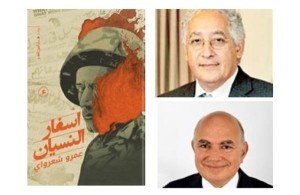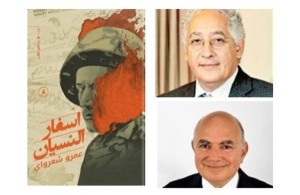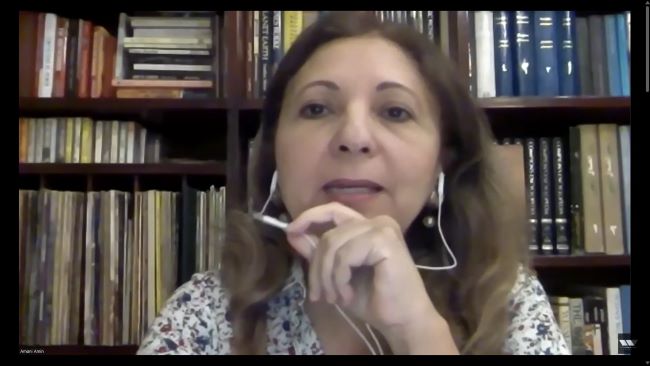Creator of Arab World Books discusses quarter century of giving voice to Arab writers
Posted in: Sunday 26 March 2023This month, Arab World Books celebrates 25 years of an evolving pursuit to catalogue Arab writers and to introduce their ideas and titles to the non-Arabic speaking world.
Dina Ezzat - Ahram Online 9 March 2023
Last week, arabworldbooks.com (AWB) highlighted the work of Egyptian novelist Miral Al-Tahawy whose novel “Ayyam Al-Shams Al-Mushrekah” (Days of the shining sun) appeared on the short list of the International Prize for Arabic Fiction for this year.
On this occasion, AWB uploaded reviews and articles on – and by – Al-Tahawy.
This “cultural actualités-oriented” approach is not particularly typical of the work of AWB.
According to Amani Amin, the founder and manager of this website, it is something that happens once in a while depending on the interest of the audience.
For example, it happened last November when the French novelist Annie Ernaux, whose book was being discussed on AWB, was announced winner of the 2022 Nobel Prize in Literature.
Amin argues that engaging world writers is part of creating bridges between Arab and international writers which is one reason why the AWB has recently been hosting regular zoom discussions of the works of Arab, including Egyptian, and foreign writers.
The beginning of AWB – back in March 1998 – was, however, certainly different.
“We started by adopting a much more basic approach by trying to provide an informative online database of as many Arab writers as possible. In a way it is still in the making but over the years we have diversified our tools of giving voice to Arab writers,” Amin said in an interview with Ahram Online.
Currently, she explained, the website includes biographies of writers, mostly modern and contemporary, book reviews, and articles of promising writers, including some who are getting published for the first time on AWB.
AWB also includes discussions with writers and book discussions.
There is also the cooperation between AWB and Amazon to help make books available for interested readers.
Amin launched AWB in a quite rudimentary form in Geneva in the late 1990s.
At that time, Amin was escorting her husband Mohamed Tawfik who is both a diplomat and a novelist.
Amin invested so much time and energy to become fully acquainted with the use of the then new internet.
The internet seemed to her the best place to start gathering information on Arab writers.
She began by uploading information on writers she liked, including Khalil Gibran, Abdel-Tawwab Youssef and writers she knew during her diplomatic sojourns.
These included Geneva-based Egyptian novelists, Bahaa Taher, Fawzia Assaad and Gamil Attia Ibrahim.
During some writers’ retreats that she joined, Amin got introduced to various writers from the Arab world whether they lived there or not.
The process of cataloguing Arab writers was progressing and slowly Amin began to feel her work bearing fruit.
AWB was mirroring both the history and development of the cultural movement in the Arab world as it introduced new writers setting new trends in the novel and in poetry during the early 1990s and early 2000s.
Amin then decided to expand her activities by giving voice to unknown writers, such as those who live in the Delta and Upper Egypt, and who had begun to get published in some cultural magazines she followed.
With advancements in the internet it was becoming easier to find people.
Furthermore, the scope that AWB was reflecting was getting wider.
More people were engaging in more heated online book discussions on AWB, to the extent that “writers, including prominent ones like Bahaa Taher, were happy to read the comments of their readers as they got posted on the pages of AWB,” according to Amin.
Things, however, began to slow down when Amin’s spouse became a full-fledged ambassador.
To her, at least at the beginning, this meant more responsibilities and less time for AWB.
Eventually, however, the diplomatic missions gave her a chance to become more informed about the new trends in online culture communication and the interests of non-Arab readers and researchers in Arab culture.
She met with members of the book industry and professors of Arab studies departments in the West who were using AWB as a key source of information on the works of Arab writers.
The political changes that took place in some Arab countries during the 2010s attracted an international audience to Arab writers and their ideas.
AWB was becoming more relevant and Amin, who had finally abandoned her career as a dentist and fully succumbed to her passion for culture and literature, was making more time and connecting with a wider network of interested writers and scholars.
In a way, she said, things were heading in the right direction, especially with new writers and those who were finding purpose in joining the writing workshops that her husband was hosting – both in person and online.
AWB was getting bigger all around the world but, for Amin, it was still not big enough.
The reason, she explained, is that many writers prefer to self-promote themselves independently through their own social media accounts.
Amin does not object in principle to writers promoting themselves.
She argues, however, that self-promotion should not replace a more collective approach that helps not just with putting the word across on this or that writer but rather with having as comprehensive a catalogue as possible on Arab writers.
Finally, she said that she would persevere until she succeeds in making AWB “an accurate and thorough comprehensive reference” on Arab writers.

World Heritage Day
18 أبريل هو اليوم العالمي للثراث وقد احتفلت به منظ...

ما بين هزيمة يونيو 1967 وانتفاضة يناير 1977 قراءة نقدية في رؤية أدبية (2)
في مقال سابق تشرفت أن نشرته مجلة "الدبلوماسي&...

ما بين هزيمة يونيو 1967 وانتفاضة يناير 1977 - قراءة نقدية في رؤية أدبية (1)
لا شك أن ما بات يطلق عليه "الروايات التاريخية...

In Memory of Gamal Hemdan
في ذكرى المبدع جمال حمدان سأظل أتذكر يوم السابع عش...
